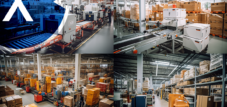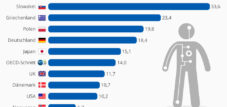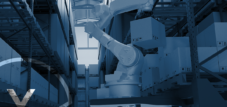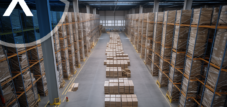Intelligent automation in industry: future prospects for logistics automation, lean production & global competition
Language selection 📢
Published on: June 11, 2024 / update from: June 11, 2024 - Author: Konrad Wolfenstein

Future prospects for logistics automation, slim production and global competition - Image: Xpert.digital
✨🚀 The transformative trends 2024 in industrial automation 🌐⚙️
📈 Technological progress and strategic realignment shape industrial automation
In 2024, industrial automation experienced profound changes that are characterized by technical innovations and strategic realignments. These developments play a crucial role in increasing efficiency, flexibility and competitiveness of companies. The progress in artificial intelligence (AI), the increased integration of information technology (IT) and operational technology (OT) as well as the growing importance of the logistics industry as an integral part of automated processes are central.
🤖 Robotics and AI: Progress and applications in automation
A crucial trend is the accelerated development of robotics and automation through artificial intelligence. AI enables machines to take on complex tasks that were previously reserved for human intelligence. This not only includes simple, repetitive activities, but also demanding tasks such as the analysis of large amounts of data to optimize production processes. Machine Learning can learn robots from their experiences and improve their efficiency steadily. For example, modern manufacturing robots use algorithms that allow you to carry out quality controls in real time and automatically make adjustments to minimize committee.
🔗 Interoperability: Simplification of the common use of automation solutions
Another important aspect is the simplification of the common use of automation solutions. The standardization of interfaces and protocols improves the interoperability between different systems and devices. This enables companies to use automation solutions more flexibly and react faster to market changes. This development not only promotes cooperation between manufacturers and suppliers, but also the cross -company integration of production chains.
🤝 IT and OT: Merging for data -controlled manufacturing processes
The fusion of IT and OT plays a central role in enabling data -controlled manufacturing processes. IT and OT systems that traditionally operate separately are increasingly networked with each other to ensure seamless data integration. This convergence opens up new opportunities for the use of real -time data in production. Sensor data can be used for optimizing the production processes in a fertilizer, which increases efficiency and minimized downtimes. In addition, the integration of IT and OT enables better analysis and monitoring of plant states and services.
🚚 Automation in logistics: Increasing efficiency and growth potential
The logistics industry also experiences significant change through automation. In this area, the potential for growth and increase in efficiency has increased massively. Automated warehouses in which robots store goods and picking are no longer a future music. These systems work around the clock and thus enable constant availability and quick processing of orders. Routes are also planned and vehicles are controlled by AI-based optimization algorithms, which means that transport routes can be made more efficient and environmentally friendly.
🖥️ Edge computing: improved response times and real real-time data analysis
Another important aspect of industrial automation in 2024 is the increased use of edge computing. Instead of sending all data for processing to central data centers, they are processed directly at the source, ie on the "edge" of the network. This reduces latency and significantly improves reaction times in production. This means that machines and systems can react faster to changes or disorders and act largely autonomously. In combination with AI, EDGE computing opens up new dimensions of real-time data analysis and process optimization.
👩🤝🦾 Collaborative robot: Integration into everyday work
In practice, there is also a growing interest in collaborative robots, so -called cobots. These robots work hand in hand with human employees and complement their skills. They take on physically exhausting or precise activities and thus relieve the workforce. Security remains a central challenge; Modern cobots are therefore equipped with numerous sensors to ensure that they can operate safely in the immediate vicinity of people.
🌱 Sustainability: Resource conservation and environmentally friendly production processes
In addition to these technological developments, sustainability also focuses on automation. Environmentally friendly production processes and the efficient use of resources are not only important from an ecological point of view, but also with regard to cost optimization and the fulfillment of legal requirements. By using automation technologies, companies can increase their energy efficiency and reduce waste. For example, AI-based systems enable precisely predictions about material consumption and thus support just-in-time production that avoids unnecessary inventory and waste.
🧑💻 Human-machine interaction: user-friendliness and advanced technologies
The human-machine interaction is also given a more important role in 2024. The usability of machines and software is increasingly improved to make it easier to use complex systems. Augmented Reality (AR) and Virtual Reality (VR) are increasingly used to support maintenance and training processes. For example, technicians can get information about machine states and maintenance directly in the field of vision using AR glasses, which minimizes errors and increases efficiency.
🔐 Cyber security: protection against increasing threats
Another trend is the stronger focus on cyber security. With the increase in networked and automated systems, the risk of cyber attacks also grows. Companies are required to develop comprehensive security strategies to protect their production processes and sensitive data. This includes technical measures such as firewalls and encryption as well as organizational measures, such as regular training for employees and strict access control.
👥 Social changes: new working environments and qualification requirements
In addition, automation in industry also brings social changes. The world of work will develop, with routine work increasingly being taken over by machines. This opens up the opportunity to focus on more creative and strategic tasks. At the same time, the need for qualifications in the area of maintenance and operation of automated systems is growing. Companies and educational institutions are therefore required to adapt and expand corresponding training and further education programs.
📊 Innovative developments and trends in industrial automation
The year 2024 is characterized by numerous innovative developments and trends for industrial automation. The progressive integration of AI, IT and OT, automation in logistics, the use of edge computing as well as focus on sustainability and cyber security are only a few of the aspects that shape the industrial landscape. Companies that recognize and implement these trends at an early stage can strengthen their competitiveness and position themselves on the market.
📣 Similar topics
- 🤖 The revolution of industrial automation by AI in 2024
- 🌐 The important role of IT-OT integration for sustainable companies
- 🚚 Automation drives the logistics industry to new heights
- 🖥️ Edge computing: The key to increasing efficiency in production
- 🤝 Cobots in the work environment: collaboration between man and machine
- ♻️ Produce sustainably: How automation makes companies green
- 🎓 Man in automated industry: adaptation of qualifications and jobs
- 🛡️ Cyber security in industrial automation: a growing priority
- 🌟 The new era of user-friendliness and MM interaction in the industrial sector
- 🔄 Standardization of interfaces: A step towards flexible automation
#️⃣ hashtags: #industrial automation 2024 #children industry #logistics automation #Edgomputing #cyberproateness
🎯🎯🎯 Benefit from Xpert.Digital's extensive, fivefold expertise in a comprehensive service package | R&D, XR, PR & SEM

AI & XR 3D Rendering Machine: Fivefold expertise from Xpert.Digital in a comprehensive service package, R&D XR, PR & SEM - Image: Xpert.Digital
Xpert.Digital has in-depth knowledge of various industries. This allows us to develop tailor-made strategies that are tailored precisely to the requirements and challenges of your specific market segment. By continually analyzing market trends and following industry developments, we can act with foresight and offer innovative solutions. Through the combination of experience and knowledge, we generate added value and give our customers a decisive competitive advantage.
More about it here:
🤖 the integration of lean production and automation
🔍 How companies can benefit from the fusion of these concepts
The integration of slim production and automation has proven to be a decisive competitive advantage for companies, especially in a constantly changing and often unpredictable global market. Through these strategies, companies can increase their agility and adapt more efficiently to the changing conditions in both local and global markets.
🏭 Slim production: Efficiency through wasteful minimization
Slim production, often referred to as lean production, has its origin in the processes developed by Toyota. The main goal of this method is to minimize waste and to achieve maximum efficiency through continuous improvements. This means, for example, that companies optimize their use of materials, shorten production times and eliminate unnecessary work steps. What may be regarded as unimportant or secondary processes in the traditional production environment can be significantly optimized and improved in a slim production environment.
🤖 Automation: precision and consistency through technology
Automation, on the other hand, means the use of technology to control and monitor tasks and processes that were previously carried out manually. Robots, AI-controlled systems and various forms of software solutions make it possible to perform tasks faster and more precisely than human labor. Repetitive or dangerous tasks in particular benefit from high precision and consistency that offer automated systems.
🏭🤖 synergy for more efficiency and flexibility
By linking these two concepts, companies can implement a variety of advantages. First of all, an integrated slim production with automation allows the efficiency of production to increase significantly. This is achieved by reducing waste and minimizing errors. The use of the latest technology can also lead to closer monitoring and analysis of processes, which in turn enables faster adjustments and improvements. In this way, companies can react more flexibly to requirements, be it in terms of changing customer issues or to adapt to new market dynamics.
🚚 Logistics: Revolutionary changes due to automation
Logistics is a particularly exciting field of application. The logistics industry is revolutionized with the advancement technologies such as the Internet of Things (IoT), artificial intelligence (AI) and autonomous vehicles. Logistics chains are becoming more transparent and efficient because real-time data is available for everyone involved. This enables more precise control of supply chains, which reduces delivery times and stocks can be managed better. Automation in logistics also has the option of significantly reducing human failure and increasing the overall security standards. For example, automatic storage systems can accelerate warehouse management and minimize errors, such as incorrect inventory bookings.
🔍 Further advantages of automation
Another advantage of automation is scalability. Companies can quickly adapt production and logistics processes to rising or falling demand without having to make significant investments in new staff. Automated systems can usually be easily scaled, which means that production lines or logistics networks can be expanded or reduced without extensive restructuring. This is particularly important in times of economic uncertainty or sudden market fluctuations.
🌱 sustainability through optimized processes
Sustainability aspects also benefit from such integration. Resource consumption can be reduced through optimized processes and automated systems. Less waste means that fewer raw materials are required and emissions can be reduced. In addition, such systems can be configured in such a way that they are operated with renewable energies, which further reduces the environmental impact. The concept of the circular economy, in which waste is reused as new resources, can also be supported by close monitoring and precise control of the production processes.
🧑💻 The human component remains crucial
The human component must not be neglected in all these technical advances. The introduction of automation and slim production requires comprehensive training for employees so that they can handle the new systems and benefit from their advantages. It requires a culture of continuous learning and adaptability within the workforce. This is the only way to ensure that the technology is used effectively and not only represents a short -term improvement, but also becomes a significant competitive advantage in the long term.
🤝 stronger customer satisfaction than added value
Finally, the combination of slim production and automation can also contribute to increasing customer satisfaction. Faster production times, fewer errors and greater flexibility make it possible to provide customer -specific products more quickly and more reliably. This enables companies not only to win new customers, but also strengthen the loyalty of existing customers.
🌍 resilience and competitiveness in global markets
The integration of slim production and automation offers companies the opportunity to act more resilient and competitive in the global markets. In the logistics industry in particular, the enormous potential of these strategies is evident in making processes more transparent, more efficient and flexible. Despite all the technology, the focus is on people, whose continuous further training and adaptability are crucial for the success of this integration. Only through the combination of technical innovations with human know-how can companies achieve sustainable success and assert themselves in a global, dynamic market.
📣 Similar topics
- 🏭 The revolution of industrial production by lean production and automation
- 🤖 Learning from Toyota: Key principles of slim production
- 💡 Introduction to automation: How technology transforms our work
- 🌍 Adaptation to the global market: the role of agility and efficiency
- 🚚 The future of logistics: IoT, AI and autonomous vehicles
- ♻️ Sustainability and technology: towards the circular economy
- 📈 scalability and economy through automation
- 🌱 Protect resources: How automation to environmental friendliness contributes
- 🧑🏭 The importance of the human component in an automated world
- 🎯 Increase customer satisfaction through quick and flexible production
#️⃣ hashtags: #slank production # -Automatization #Industrie4_0 #Sustainable Technology #customer satisfaction
Our recommendation: 🌍 Limitless reach 🔗 Networked 🌐 Multilingual 💪 Strong sales: 💡 Authentic with strategy 🚀 Innovation meets 🧠 Intuition
At a time when a company's digital presence determines its success, the challenge is how to make this presence authentic, individual and far-reaching. Xpert.Digital offers an innovative solution that positions itself as an intersection between an industry hub, a blog and a brand ambassador. It combines the advantages of communication and sales channels in a single platform and enables publication in 18 different languages. The cooperation with partner portals and the possibility of publishing articles on Google News and a press distribution list with around 8,000 journalists and readers maximize the reach and visibility of the content. This represents an essential factor in external sales & marketing (SMarketing).
More about it here:
📌 Other suitable topics
🏭 Industrial automation and global competition
🌍 Adaptation to global competition and the implementation of slim production methods are decisive factors for success in modern industrial automation. By optimizing production processes and reducing waste, companies can improve their efficiency, reduce costs and react more flexibly to market changes.
📉 slim production (lean production)
Slim production techniques focus on minimizing waste and constantly improving production processes. The most important principles include:
1. Define value from the customer's point of view
Only activities that create real value for the customer are considered to be value.
2. Value stream analysis
Identification of all steps in the production process to eliminate non-value-adding activities.
3. Flow principle
Ensuring a continuous flow of materials and information without disturbances.
4. Pull system
Production is based on the actual customer needs instead of predicting.
5. Continuous improvement (Kaizen)
Ongoing process optimization through active inclusion of all employees.
➡️ By implementing slim production, companies can increase their efficiency and flexibility, which is of crucial importance in global competition.
🌐 Adaptation to global competition
In order to remain competitive in the global market, companies must observe the following aspects:
1. Cost management
Slim production and automation help to lower production costs and at the same time improve product quality.
2. Flexibility and responsiveness
Automated systems enable companies to react faster to market trends and customer needs, including the quick adjustment of production lines or the rapid development and introduction of new products.
3. Technology use
The use of modern technologies such as IoT, AI and mechanical learning optimizes production processes and supports data -based decision -making processes.
4. Worldwide supply chains
Adaptation and optimization of global supply chains are necessary to ensure delivery reliability and minimize risks.
➡️ The combination of slim production and automation enables companies to remain agile and competitive in a dynamic and often unpredictable global market. This enables you to adapt efficiently to local and global market changes.
We are there for you - advice - planning - implementation - project management
☑️ SME support in strategy, consulting, planning and implementation
☑️ Creation or realignment of the digital strategy and digitalization
☑️ Expansion and optimization of international sales processes
☑️ Global & Digital B2B trading platforms
☑️ Pioneer Business Development
I would be happy to serve as your personal advisor.
You can contact me by filling out the contact form below or simply call me on +49 89 89 674 804 (Munich) .
I'm looking forward to our joint project.
Xpert.Digital - Konrad Wolfenstein
Xpert.Digital is a hub for industry with a focus on digitalization, mechanical engineering, logistics/intralogistics and photovoltaics.
With our 360° business development solution, we support well-known companies from new business to after sales.
Market intelligence, smarketing, marketing automation, content development, PR, mail campaigns, personalized social media and lead nurturing are part of our digital tools.
You can find out more at: www.xpert.digital - www.xpert.solar - www.xpert.plus
































